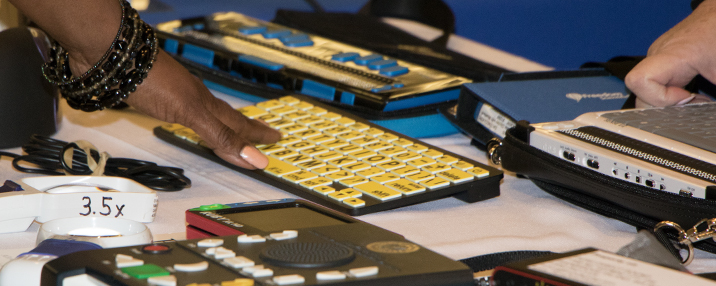- Modified keyboards enable people with physical challenges to use a computer. These keyboards feature extra-large or extra-small keys, high contrast letters and numbers on the keys, or can be controlled with the head or the eyes.
- Communication devices provide alternatives for people who cannot rely on speech for all their communication needs. Devices range from those with just a few recorded messages to those that enable individuals to communicate any message they desire.
- Toys give children the opportunity to explore their world and make fun things happen. CDS’s Delaware Assistive Technology Initiative (DATI) has switch-operated toys, sound-generating toys, toys with interesting colors and textures, and more.
- Portable ramps provide access to buildings when built-in ramps or lifts are not available. Though not intended as permanent solutions, portable ramps can provide temporary access for visitors or those being discharged from care facilities.
- Modified telephones support people with hearing loss, memory loss, vision loss or physical disabilities. DATI’s inventory includes Captel phones, amplified phones, big button phones and phones with pictures.
- Talking products are useful for people with low vision or blindness. Talking clocks, scales, blood pressure monitors and glucose meters support greater independence in self-care and daily activities.
- Modified utensils can empower people with physical challenges. DATI’s inventory includes utensils with built-up handles, weighted utensils, angled utensils utensils that attach to cuffs and splints and utensils that counteract tremors.
- Switches provide a means to access computers, communication devices and other tools for people with physical challenges. Switches can be activated with a gentle touch, large body movements, vocalization and the blink of an eye.
- Amplification systems make sound louder for individuals with hearing loss. Many are designed to work in conjunction with hearing aids. DATI has personal amplification systems, television amplifiers and loop systems.
- Alerting systems support people who are deaf and hard of hearing. They flash or vibrate, signaling when someone’s at the door, smoke alarms or carbon monoxide alarms are triggered, an alarm clock is sounding or a baby’s crying.

